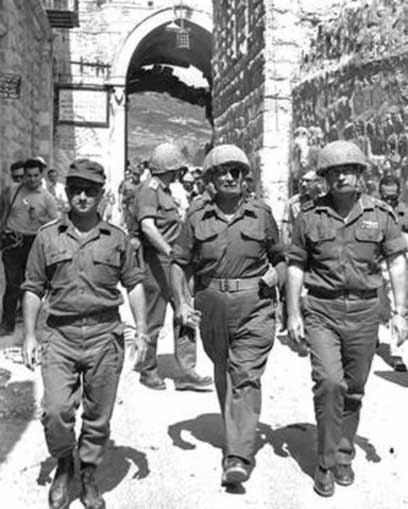Today 40 years ago. It may sound like a hackneyed intro but it's true. Today 40 years ago at 7:14 am, Israeli Air Force planes took off towards airports positioned in the Sinai and deep into Egypt.
The weeks of the nerve-racking waiting period in the hope of reaching a diplomatic settlement to Nasser's naval blockade came to an end. Foolishly and arrogantly, he closed off the Straits of Tiran to Israeli shipping. On May 20th he delivered a defiant speech at the Egyptian Air Force base: "We shall never permit the Israeli flag to pass the Straits of Tiran," he bragged and added: "The Jews are threatening war. So we tell them: Ahlan wa Sahlan (welcome)."
Special features on Six Day War
The Six Day war began with Nasser's "Ahlan wa Sahlan." That's when the point of no return was crossed.

Yitzhak Rabin, Moshe Dayan and Uzi Narkiss entering the Old City
In his first battle order, composed by author Amos Oz, Major General Tal, Commander of the Armored Corps, wrote: "Today we shall set out to smash the hand that was sent to strangle us…this is a battle the enemy wanted, the enemy launched it, yet the enemy will get more than it bargained for; we are not coveting their land (the Arabs') and their property. We have not come to destroy their county or to inherit it…we have come to wipe out their plot of destruction."
The war was preceded by existential fears: The Israeli public was exposed to Arab propaganda reminiscent of the Nazi regime, with spokespersons threatening to kill, destroy, eliminate and throw the Jews into the sea.
"We shall meet in the destroyed Tel Aviv and realize our dream to see the destruction of Israel," the choked hysterical voice of the Cairo radio presenter called on the incensed masses in the streets of Cairo and the rest of Egypt. In Tel Aviv and Jerusalem public parks were prepared as mass graveyards, and an entire generation of Holocaust survivors felt as though the days of persecution had returned.
'The war has ended, we won'
They did not return." The second Holocaust" did not occur. At 10 am that day, June 5th 1967, Ezer Weitzman, who served as the head of the military operations branch and deputy chief of staff, called his wife and informed her curtly: "The war has ended, we won."
Weitzman was right about the victory, but he was wrong about its ending. At 11:15 the Jordanians began systematically shelling targets in the Israeli part of Jerusalem, in the Jezreel Valley and on the outskirts of Tel Aviv. King Hussein was misled by Nasser; he trusted the false reports coming from Cairo and joined the war.
Following 132 hours of fighting, as the sun set over the Middle East on June 12th, 1967, IDF soldiers sat on the banks of the Suez Canal in the South, on the banks of Jordan River in the east, and on the peaks of the Golan in the north.
The nineteen-year-old State of Israel had completely destroyed the Arab air forces and broke the chokehold that Arab leaders sought to tighten around its exposed neck. Their armies had suffered their third great defeat in 19 years. Israel recorded one of the greatest victories in military history. It was a just war, and a do-or-die war in every sense of the word.
Torn from within
However, it didn't end even when an armistice was reached. The consequences of the Six Day War are still very much with us today: Israel is still ruling over a major part of the territories overtaken 40 years ago, which are deemed occupied territories by international law.
The people of Israel confronted the Palestinian people in these territories, and the two nationalist movements clashed – again head on. With eyes wide open, they both decided to embark on a path of mutual foolishness - Israel for the settlements and the Arabs for the right of return.
"The Palestinian problem" has been stuck down Israel's throat for the past 40 years. We can't swallow or vomit it. It has dictated Israel's image more than any other event. The dispute over ownership of the land and how to partition it erupted in 1967 in full force and hasn't died down since. Once the cannons fell silent the movement for "Greater Israel" faced the "Land for peace" movement, and Israeli society was torn from within.
The vision of two states for two peoples was missed not because of the Six Day War but despite its achievements. It wasn't the last war either: Since then Israel has gone through eight more wars, all closely affiliated to the consequences of the Six Day War.
As days went by it became apparent that there is no enlightened occupation. As long as the occupation lasts, it becomes less enlightened and more inhumane, insufferable, corrupt and corruptive. In the summer of 2007 the bloody conflict with the Palestinians is further away from being resolved than it was 40 years ago.
'Arabs seek to wipe out Israel'
The 40th anniversary of the Six Day War is prominent in the complete absence of public and official events commemorating the occasion – except for the organizations protesting 40 years of occupation. A serious social and historic discussion on the war, its consequences and implications was conducted on the pages of the Yedioth Ahronoth newspaper, which ahead of its Independence Day supplement convened a debate attended by professors Benny Morris, Michael Oren, Shaul Mishal and Oz Almog.
Their message was frighteningly pessimistic: "On the Arab street and among Arab public opinion, the question of Israel's existence is still very much on the agenda," said Professor Oren. "Muslim civilization has been taken over by forces that have no doubt that Israel will be wiped off the face of the earth," said Professor Almog. "The Palestinian obsession has gripped the Arab world," said Professor Mishal. Professor Morris concluded: "The processes in our region are leading to the next war, because the Muslim world is seeking a bloody conflict with the entire Western world and with Israel in particular. Their objective is to wipe out Israel and the Jewish State."
However, the words of these professors – who are leading researchers in their respective fields – do not set the tone of international public opinion over the Six Day War and barely influence it. Due to Israeli neglect, the global media stage is completely open to those who view the Six Day War as a "wasted victory" and a "cruel ongoing occupation."
Forty years after the Six Day War the Israel of the Ehud Olmert Administration has been defeated in the PA arena, defeated in the politics of history and incapable of instilling a minimal sense of spiritual uplifting. Similar to the unforgettable book "So Sorry We Won" (1967) by Ephraim Kishon and caricaturist Dosh – Israel of 2007 appears to be ashamed of what happened here 40 years ago.
But had things been different, we wouldn't be here today.
















